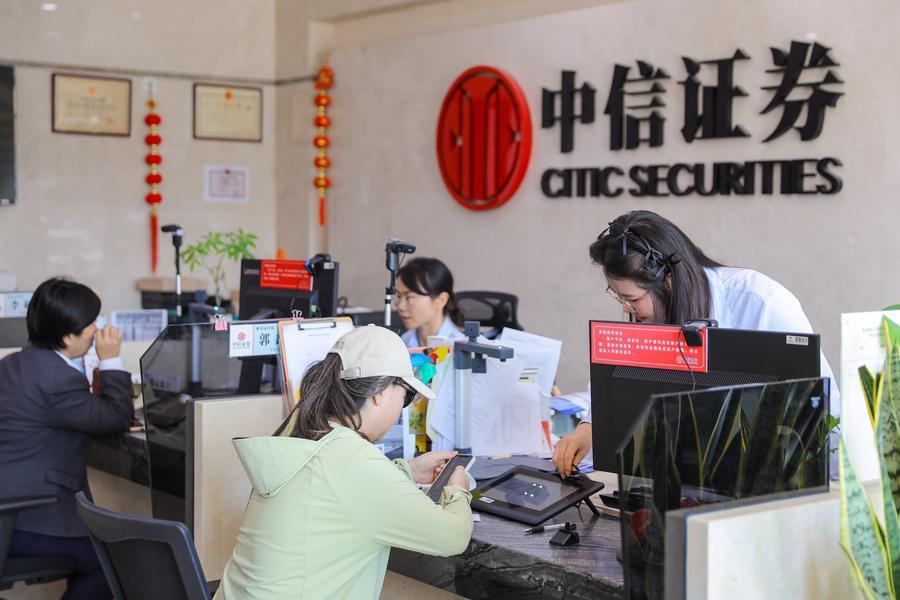
 0 Comment(s)
0 Comment(s) Print
Print E-mail Xinhua, November 15, 2024
E-mail Xinhua, November 15, 2024
China's economic recovery showed further signs of strengthening in October as recent pro-growth policies provided a fresh boost to the world's second-largest economy.
Key economic indicators for the past month have recovered markedly, said the National Bureau of Statistics (NBS), which highlighted growth in consumption, services and foreign trade, as well as steady performance in investment and industrial production.
"The combined policy effects have been effectively unleashed, yielding excellent results," NBS Spokesperson Fu Linghui told a press conference Friday.

A staff member (L) introduces the policies related to car purchase subsidies to consumers at a 4S store in Chongqing, southwest China, Oct. 17, 2024. (Xinhua/Wang Quanchao)
REMARKABLE REBOUND
Consumption was "a bright spot" of the economy last month, Fu told the media. Retail sales of consumer goods expanded 4.8 percent year on year, quickening from the 3.2 percent increase in September.
The national trade-in program, the week-long National Day holiday, and the early launch of the annual shopping festival were among the major drivers of the solid consumption growth, according to Fu.
Specifically, driven by the trade-in program, which offers consumers subsidies on the replacement of a wide range of products, household appliances and audio-visual equipment reported a 39.2 percent surge in combined sales compared to a year earlier.
The sales of major trade-in products contributed 1.2 percentage points to the overall retail sales growth in October, according to Fu.
Industrial production and investment both maintained steady growth, with a value-added industrial output up 5.3 percent year on year last month and fixed-asset investment rising 3.4 percent in the first 10 months, NBS data shows.
Fu noted the stellar performance of the service sector and foreign trade as well. In October, the index of services production grew by 6.3 percent year on year, while total goods imports and exports expanded 4.6 percent in yuan terms.
"In light of changes in economic performance in September and October, especially in October, we have gained further confidence in achieving this year's economic development goals," Fu said.
In the face of mounting challenges at home and abroad, China's GDP grew 4.8 percent year on year in the first three quarters of this year. The country set a target for economic growth of around 5 percent for this year.

Investors open accounts at a securities firm in Qingdao, east China's Shandong province, Oct. 8, 2024. (Photo by Zhang Ying/Xinhua)
IMPROVING MARKET CONFIDENCE
Fu particularly noted an uplift in market sentiment brought about by the incremental policies introduced since late September, which, besides the trade-in program, included supportive real-estate policies and the issuance of ultra-long special treasury bonds to boost domestic demand and strengthen economic impetus.
In one of the latest steps, Chinese lawmakers approved a State Council bill earlier this month raising the ceiling on local government debt by 6 trillion yuan (about 833 billion U.S. dollars) to replace existing hidden debts.
"With the benefits of the incremental policy package unfolding, there has been a boost in market vitality as well as the confidence of enterprises, consumers and investors," Fu said.
For business entities, the purchasing managers' index (PMI) for China's manufacturing sector came in at 50.1 in October, surpassing the boom-or-bust line of 50 for the first time since May. The business expectation index rose to a four-month high of 54.
Stock trading volumes in the Shanghai and Shenzhen markets surged by over 150 percent last month, the largest increase of 2024, according to Fu.
Property market activity also recovered in October. "Property inquiries and viewings have increased noticeably, while the total area and value of commercial housing sales saw substantial improvement," he said, voicing optimism on the outlook of the property market.
Echoing the increasingly favorable sentiment, multiple foreign institutions, including UBS and Goldman Sachs, have revised up their China 2024 growth forecasts to reflect positive changes seen in the economy.
Economists with Goldman Sachs noted that China's latest round of incremental policies clearly indicates that policymakers have made a turn on cyclical policy management and increased their focus on the economy.
Nomura, raising its forecast on China's year-on-year GDP growth in the fourth quarter to 4.9 percent from 4.4 percent, said this week that it expects the trade-in program for consumer goods would continue playing a crucial role in boosting consumption.
However, striking a note of caution, Fu also mentioned the complicated international environment, the lingering weakness in domestic demand, and some businesses that are still facing difficulties.
For the next stage, efforts must be made to step up macro control, ensure that policies are effectively implemented, consolidate and enhance the momentum of economic recovery, and promote high-quality economic development, he said.
Go to Forum >>0 Comment(s)